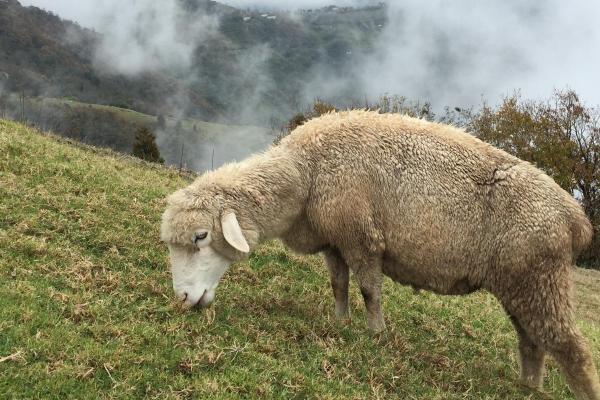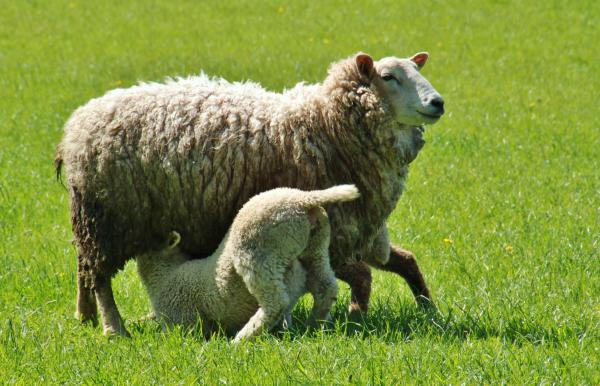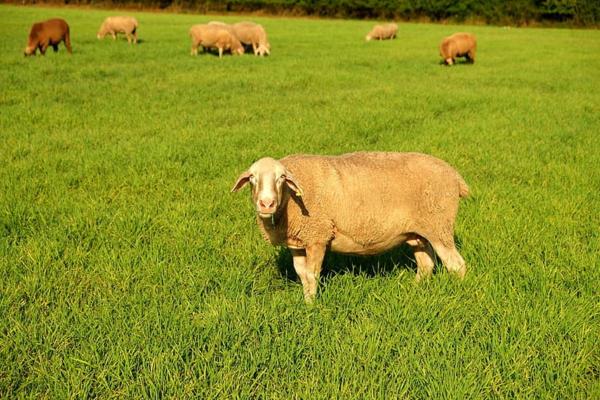
Sheep are important animals in many cultures and are often used in religious and cultural traditions. Often raised for meat and milk, they are best known for their fluffy wool, which is used to make clothing and other textiles. Sheep are native to many parts of the world, including Europe, Australia, New Zealand and North America. In addition, sheep are social animals and often live in herds led by a dominant male, the ram.
In this AnimalWised article, you will learn what do sheep eat and other fascinating facts about these animals.
The digestive system of sheep
Sheep are herbivorous animals that feed mainly on plants and vegetation. They are able to graze on a variety of plants and grasses, which are their primary source of food. They are also able to digest fibrous vegetation that other animals cannot, such as hay and straw.
The digestive system of sheep is complex and well suited for breaking down and extracting nutrients from plant material. Like other ruminants, sheep have a stomach with four chambers that allows them to extract the maximum amount of nutrients from their food. These chambers are:
- Rumen: is the largest chamber and contains billions of microorganisms that help break down the fibrous plant material that sheep eat.
- Reticulum: acts as a filter, catching large food particles before sending them back to the rumen for further digestion.
- Omasum: absorbs water from the digested material before it enters the abomasum.
- Abomasum: the sheep's actual stomach.
Once the food is broken down in the abomasum, it enters the small intestine, where most of the nutrients are absorbed into the bloodstream. The large intestine (colon) then absorbs the remaining water and nutrients before the waste is excreted in the feces.
Because sheep can break down fibrous plant material so effectively, they are able to extract many nutrients from even low-quality forages such as hay and straw. Still, they need a balanced diet that contains the right mix of carbohydrates, proteins, and minerals to stay healthy and productive.
You may also be interested in this other article, where we explain what herbivorous animals are and some interesting facts.
What do baby sheep eat?
Baby sheep, also called lambs, initially depend on their mother's milk to meet all their nutritional needs. The milk produced by ewes is very rich in energy, protein and fat, which are necessary for the growth and development of the lambs.
Lambs usually begin nursing a few hours after birth and will nurse for several weeks to a few months, depending on breed and housing conditions. During this time, lambs should have access to their mother's milk around the clock and will nurse frequently throughout the day.
In addition to milk, lambs may also begin to nibble solid foods during the first few days of life. This helps them become accustomed to solid foods and aids in the development of their digestive systems. However, solid food should not be their main source of nutrition until they are weaned from their mother's milk.
How to feed an orphan lamb?
Feeding an orphaned lamb can be a difficult task, but with proper care and attention, it is possible to raise a healthy and thriving lamb.
It is important that newborn lambs receive colostrum, the first milk produced by the ewe, in the first hours of their lives. This milk is rich in antibodies and other nutrients that help protect the lamb from disease and infection.
Once the lamb has received colostrum, it can be fed a milk replacer designed specifically for lambs. Newborn lambs need to be fed frequently, usually every 2-4 hours. As the lamb grows, the frequency of feeding can be gradually reduced. As the lamb grows, it can be gradually introduced to solid foods, starting with small amounts of hay or grass.
It is critical to monitor the lamb's growth and health regularly to ensure that it is receiving proper nutrition and care. In addition, the advice of a veterinarian or experienced shepherd may be helpful to ensure that the lamb is receiving optimal care.
You may also be interested in this other article about the differences between a goat and a sheep.

What do adult sheep eat?
Adult sheep are primarily herbivores and their diet consists mainly of forages such as grasses, legumes, and hay.
The specific diet of sheep can vary depending on factors such as age, breed and nutritional requirements. It can also vary depending on whether sheep live in a farm or if they are able to graze. Farm-raised sheep are typically fed a combination of hay, grain, and other supplemental feed, while sheep that graze on pasture consume primarily grasses and other forages.
Sheep that are able to graze will mainly feed on pasture grasses. Sheep are well suited to grazing and can meet most of their nutritional needs through high-quality grass. Common pasture grasses include :
- Ryegrass
- Clover
- Timothy
It is important to ensure that sheep have access to high-quality forage when they graze on pasture. The quality of the forage can impact the nutritional content and availability of essential minerals and vitamins. Additionally, sheep that graze on pasture may require access to mineral and vitamin supplements if the forage does not provide sufficient amounts of these nutrients.
What do farm-raised sheep eat?
Sheep kept on the farm may also eat forages such as hay or silage during periods when pasture is not available or forage quality is low. Below are some common feeds that are typically part of the diet of adult sheep on a farm:
- Hay: hay can be made from various types of grasses and legumes.
- Silage: silage is a fermented feed made from grasses, legumes, or corn.
- Grains: some sheep require additional energy and protein in their diets, especially during periods of high stress or when they are pregnant or lactating. Grains such as corn, barley, or oats can be fed to supplement the sheep's diet.
- Minerals and vitamins: sheep need a balanced diet that includes important minerals and vitamins. Minerals can be fed in the form of blocks or loose minerals, and vitamins can be added to the feed or offered as a separate supplement.
It is essential to provide sheep with a balanced diet that meets their nutritional needs to ensure their health and productivity. Consultation with a veterinarian or experienced shepherd can be helpful in developing an appropriate feeding plan for a flock of sheep.
Do not miss this other article where we list the four types of ruminant animals and share some interesting facts about them.

How much do sheep eat?
The amount of feed sheep eat may depend on factors such as age, weight, activity level, breed, and environmental conditions such as temperature and quality of feed. However, as a general guideline, adult sheep typically consume about 2-4% of their body weight in forage per day. For example, a 150 pound (ca. 68 kg) sheep would consume about 3 pounds (1.36 kg) to 6 pounds (2.72 kg) of feed per day.
If you want to read similar articles to What Do Sheep Eat?, we recommend you visit our Homemade diets category.
- Government of Argentina. Sheep nutrition . Available at: https://www.argentina.gob.ar/sites/default/files/02-6-21_materialnutricion_de_ovinos.pdf
- Reavill, C. (2000). " Ovis aries ". Animal Diversity Web. Available at: https://animaldiversity.org/accounts/Ovis_aries/
- Silva, J. (2021). Keys in the management of newborn lambs . Available at: https://rumiantes.com/claves-en-el-manejo-de-los-corderos-recien-nacidos/